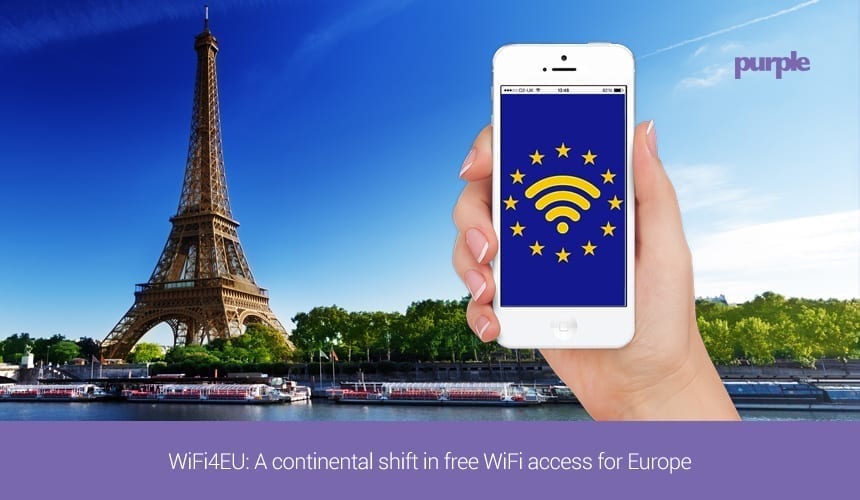On May 29th, 2017 the European Parliament, the Council, and the Commission reached a political agreement to provide free WiFi connectivity for citizens and visitors in the European Union. The WiFi4EU scheme will be delivered through simple and non-bureaucratic procedures including online applications, payments by vouchers (each worth 15,000 Euros) and light-touch monitoring requirements. The projects will be selected on a first-come, first-serve basis to install high speed, free public WiFi throughout EU communities and their public spaces, such as:
– Parks and squares
– Hospitals and health centres
– Public Buildings
– Museums
– Libraries
Purple have put together a number of resources, such as background, timeline, checklist and more, to support municipalities and associates with their WiFi4EU implementation.
The three European institutions will work together and set aside EUR 120 million, a sizeable budget, to support the installation of state-of-the-art WiFi equipment between 2017 and 2019. Upon completion in 2020, the installation will benefit 6,000 to 8,000 EU communities of both citizens and international visitors. When the General Data Protection Regulation (GDPR) policy comes into effect on May 25th, 2018 EU public authorities will also have to make sure their service providers are GDPR compliant.
President of the European Commission, Jean-Claude Juncker, spoke at the State of Union speech on WiFi4EU, stating: “Everyone benefiting from connectivity means that it should not matter where you live or how much you earn. We propose today to equip every European village and every city with free wireless internet access around the main centres of public life by 2020.”
While initial equipment and installation costs are covered under the WiFi4EU budget, ongoing subscription and maintenance costs are to be paid by the municipalities and their associations. As we follow the roll-out over the next three years Purple will be working alongside our partners and customers to integrate cities and continents into ‘smart’, GDPR compliant digital markets. Purple have helped municipalities around the world use high-end WiFi infrastructure and the Internet of Things to turn into Smart Cities by collecting data, understanding how people are using physical spaces, and making more informed decisions.
At Purple, we understand any investments of WiFi installation, including the WiFi4EU scheme, need to generate a return on investment from analytics while offering a fast, free, and secure connection. As a first mover in our market we felt it logical to be the first GDPR compliant WiFi provider almost one year ahead of legislation. Purple’s Profile Portal gives end users around the world complete transparency and the ability to control how their data is used by;
– Viewing all of the personal information collected about them
– Accessing a breakdown of their activities, including the venues they have visited
– Choose their marketing preferences for future marketing communications
WiFi and the Internet of Things has the potential to help cities adapt to change more quickly and become more ‘smart’ to the needs of the population, while reducing impact on the environment. Purple’s platform already captures visitor data through WiFi for the City of York, the Highland City Council of Inverness, and London’s Borough of Brent. From as early as 2013, we have been empowering municipalities to gain a deeper understanding of their visitors. With presence reports, municipalities can identify how long people stay on average, the split between repeat and new visitors, peak traffic times in pedestrian shopping malls and attractions. Enhancing local WiFi access points to analyze and report information in real-time will be key to ensuring the WiFi4EU scheme is sustainable for public authorities in the EU’s Digital Single Market.
Technology’s pace for innovation is constantly increasing demand for easier access and improved services to the Internet. Businesses and institutions are able to improve connectivity, enable easier flow of information in the data economy, and collaborate over huge amounts of data forming efficient digital markets. Public authorities and local businesses can exchange data across transport, education, physical infrastructure, and healthcare industries to vastly improve urban developments and services. End users can also improve experience and productivity with secure connections that simplify login journeys and carry over information from smart devices, wearables, journey plans, cars, and even eHealth services. As more digital markets combine solutions and form Smart Cities, Purple are excited to become part of the next Internet of Things movement – Smart Continents.
